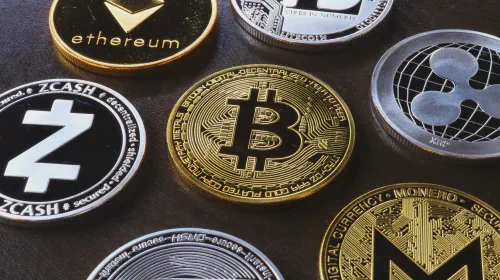Is the World Ready for a Cashless Future? Pros and Cons Explained
Salomon Kisters
Jun 2, 2023This post may contain affiliate links. If you use these links to buy something we may earn a commission. Thanks!
The world is rapidly moving towards a cashless future, and the role of physical currency in payment transactions is diminishing at an alarming rate.
Multiple countries are already experiencing the transition toward digital payment systems, and the COVID-19 pandemic has only accelerated this trend.
However, the question that boggles the mind is whether the world is indeed ready for a cashless future. While some argue that digital payment systems are faster and more convenient, others express concerns over security, privacy, and the digital divide.
Therefore, in this blog post, we will delve into the pros and cons of a cashless future and attempt to answer the age-old question: Is the world really ready for a cashless future?
The Growth of Digital Payment Systems
As technology advances, digital payment systems have become more prevalent around the world. From mobile banking apps to contactless payments, it’s clear that consumers are ready for a more streamlined and efficient way to manage their finances.
The use of mobile payment systems has exploded in recent years, with countries like China leading the way in the adoption of digital payment methods. Additionally, fintech startups have emerged, offering innovative solutions that challenge traditional banking systems.
One reason for the growth of digital payment systems is convenience. With just a few taps on a smartphone, payment can be made in seconds, eliminating the need for cash or cards. This not only saves time but also reduces the risk of loss or theft.
Another reason is the increasing need for security and privacy in financial transactions. Many digital payment systems offer enhanced security features like biometric authentication and encryption, giving consumers greater peace of mind when making transactions.
The Pros and Cons of a Cashless Society
The idea of a cashless society has been debated for many years now, with proponents arguing that it would bring numerous benefits while opponents raise concerns about its potential drawbacks.
On the one hand, a cashless society would eliminate the need for physical currency, which would reduce the risk of theft and fraud. It would also make transactions more efficient and convenient, since people could use their phones or other electronic devices to make payments, instead of carrying cash around with them. Additionally, a cashless society would allow for greater financial transparency, since all transactions could be tracked and recorded.
On the other hand, some worry that a cashless society would create problems for those who don’t have access to technology or who prefer to use cash for personal reasons. It could also lead to increased surveillance and a loss of privacy, as all financial activity would be monitored and controlled by banks or other institutions. Furthermore, a cashless society could be vulnerable to cyberattacks, which could potentially disrupt entire economies.
The pros and cons of a cashless society are complex and multifaceted. While there are certainly benefits to be had, there are also risks and drawbacks that must be considered before we embrace this new way of conducting transactions.
Cybersecurity Risks and Data Protection Measures
As we move towards a cashless economy, cybersecurity risks become a major concern. With digital transactions, sensitive financial information is vulnerable to data breaches and cyber-attacks. This is especially concerning given that the world has seen an increase in cyber crimes in recent years.
To mitigate these risks, stringent data protection measures need to be put in place. Financial institutions and companies that deal with digital transactions need to invest in advanced cybersecurity technologies and protocols. This includes implementing encryption technologies, firewalls, multi-factor authentication, and regular security audits.
Moreover, individuals need to prioritize their own cybersecurity by being vigilant with their personal data. This involves avoiding unsecured Wi-Fi networks, using strong passwords, and limiting personal information shared online.
The Impact on Unbanked and Underbanked Populations
As more and more transactions move towards digital modes of payment, the impact on those who are unbanked or underbanked becomes a cause for concern. These people, who may not have access to traditional banking services, rely heavily on physical cash as a means of conducting transactions. A move towards a cashless future could potentially leave them behind.
Many argue that the development of digital wallets and mobile banking applications can enable easier access to banking services for the unbanked and underbanked. However, the reality is that these services require a level of technical knowledge and infrastructure that may not be available in some parts of the world. Additionally, there are often fees associated with these services that can make them unaffordable for those with limited financial resources.
Furthermore, there is the issue of trust in digital payment systems. Without physical cash, individuals may be more vulnerable to fraud and scams, which can exacerbate their financial instability. There is also the concern that a single point of failure in a digital payment system could have catastrophic consequences for those who rely on it.
The Role of Governments and Central Banks in Shaping the Future of Payments
Cashless payments are gaining popularity around the world, and this trend is likely to continue in the coming years. Governments and central banks play a crucial role in shaping the future of payments by regulating the financial system, developing new payment technologies and promoting financial inclusion.
Central banks are responsible for maintaining financial stability and ensuring that payment systems function smoothly. They set the rules for banks and other financial institutions that offer payment services, such as credit and debit card payments, wire transfers and mobile payments. Central banks also promote the use of electronic payment systems, as they are more efficient, secure and cost-effective than cash.
Governments also play an important role in shaping the future of payments by creating policies that promote financial inclusion and reduce the use of cash. Digital payments can help reduce the cost of financial transactions and increase access to financial services for people who are excluded or underserved by the traditional banking system. Governments can also promote the development of new payment technologies, such as blockchain and digital currencies, which have the potential to revolutionize the way we make payments.
However, governments and central banks must also balance the benefits of cashless payments with the need to protect consumers’ privacy, security and financial stability. They must ensure that payment systems are resilient to cyber-attacks and other risks and that consumers’ data is protected. Moreover, they must also address the concerns of those who may not have access to digital payments or may be reluctant to use them, such as the elderly, the poor or those living in rural areas.
In conclusion, governments and central banks will continue to play a critical role in shaping the future of payments. They must ensure that payment systems are secure, efficient and accessible to all while promoting financial inclusion and reducing the use of cash.
By doing so, we can create a safer, more efficient and more inclusive financial system for everyo
Stay informed with the latest insights in Crypto, Blockchain, and Cyber-Security! Subscribe to our newsletter now to receive exclusive updates, expert analyses, and current developments directly to your inbox. Don't miss the opportunity to expand your knowledge and stay up-to-date.
Love what you're reading? Subscribe for top stories in Crypto, Blockchain, and Cyber-Security. Stay informed with exclusive updates.
Please note that the Content may have been generated with the Help of AI. The editorial content of OriginStamp AG does not constitute a recommendation for investment or purchase advice. In principle, an investment can also lead to a total loss. Therefore, please seek advice before making an investment decision.

Blockchain Technology for Intellectual Property Rights Protection
Learn how blockchain technology can protect intellectual property rights and prevent fraud in creative industries. Discover how OriginStamp offers a solution for secure documentation and timestamping.

What is the Valuation of Kraken?
Learn all about Kraken, and its valuation in our comprehensive blog post.

Blockchain 1.0 vs. 2.0 vs. 3.0 - What's the Difference?
Blockchain is a disruptive technology that has been around for 40 years. But what's the difference between Blockchain 1.0, 2.0, and 3.0?
Protect your documents
Your gateway to unforgeable data. Imprint the authenticity of your information with our blockchain timestamp